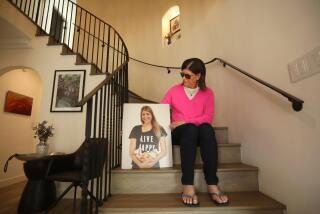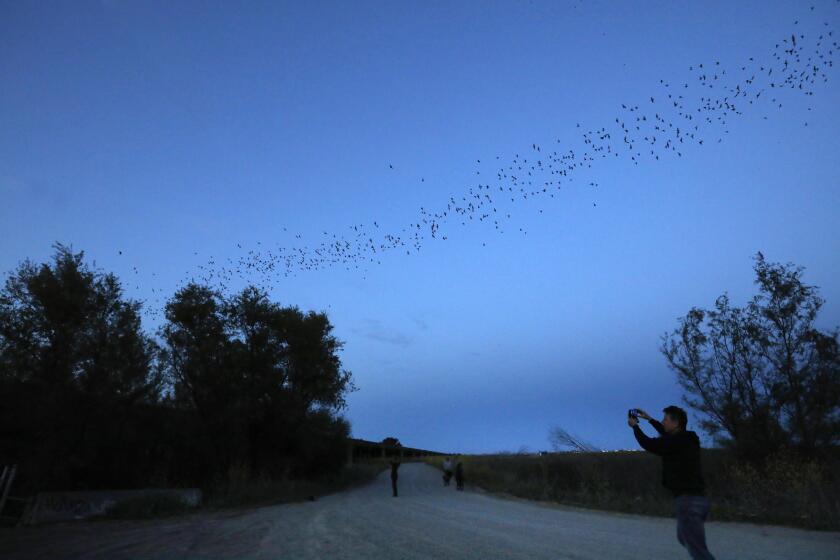Watching a Life of Promise Wither Away : AIDS Victim’s Mother Helps Others to Cope
SAN DIEGO — We buried Peter’s ashes on the windy Santa Fe hilltop where my uncle’s adobe home stands. A chilling wind swept down from the snow-whitened Sangre de Cristo peaks, whining through the foothills. Snow would fall soon. Far to the west, the vermilion sun fell slowly behind the purpling Jemez range. We waited until sunset for Peter’s farewell.
Peter had finally come back to Santa Fe, and we were all with him. Huddling together against the wind, we said goodby to Peter, one by one, each in his own way. We buried his ashes deep in the pit (two relatives) had dug earlier. Deep in the hard, red soil.
Now his spirit was free--free to watch the seasons change on the mountains above, free to see his sunsets, free to sing eternally through the groves of cedar and pinon and smell their pungent smoke rising from squat, adobe chimneys.
Free, at last.
Barbara Peabody
From “The Screaming Room:
A Mother’s Journal
of Her Son’s Struggle
with AIDS”
Peter Vom Lehn died in the winter of 1984. He was 29. His was a life of promise and beauty, his mother said. He wanted to be a singer. By the time he died, he had made music--like bringing a family, torn apart by divorce, closer together.
An autopsy revealed that Peter died of rapid erosion of white blood cells, CMV (cytomegalovirus) pneumonia, and congestive heart failure. All were brought on by AIDS, which wiped away his body’s immune system.
The worst killer was CMV. It contributed to blindness, “terrifying” vertigo, a “final” paralysis, and, said Peabody, “cerebral and neurological changes” that left him speechless and pale.
Barbara Peabody, 53, isn’t sure as the mother of an AIDS victim that she’s free--”Free, at last,” as Peter is. She may never be. Mothers, she said, feel a “special kind of torment” for an illness difficult to tolerate, harder to comprehend.
A mother’s torment is not necessarily worse than that of a father, she said, just different. For both parents, the loss of a child is the roughest to go beyond, she said, the loneliest by far. Peabody said she spoke for herself and her ex-husband, who was also at Peter’s side when he died.
She decided, in desperation, to write. A book, she thought, would be an agent of therapy. It might give the family a living document. It might cut away myths and prejudice. It might help victims, something Peabody is dedicated to full time.
She struck a deal with Oak Tree Publications, a San Diego firm that plans nationwide distribution through major bookstore chains. She is modest about the book, in terms of money and reviews, hoping mainly that it will educate.
“The current hysteria about AIDS is a sad commentary on the American public,” she said. “People are so close-minded and ignorant. AIDS brings home our worst side.
“It (the disease) is not easily contagious. Doctors have determined it is transmitted through sex or blood. You don’t get it from toilet seats. You don’t get it from gay waiters at restaurants. All of that breeds such stupid discrimination.”
She took a drag on a cigarette.
“Ignorance and prejudice always make me angry,” she said. “It’s the best example of the human race not using its brain.”
Peabody is most aware of the helplessness of AIDS victims. She’s empathic with those who cling to the hope of cures, who then hear that “every damn case” is fatal.
“A hundred percent is hard to take,” she said.
A lanky woman with a husky voice, Peabody spends much of her time working with the San Diego AIDS Project. The group is made up largely of gay men, the primary victims of AIDS (acquired immune deficiency syndrome). She counsels one woman, a former heroin addict who caught the disease from an AIDS-tainted needle.
Peabody helps her people with painting (she is by profession an artist). She helps them with an attitude many call, with a wry twist, “infectious.” She has a laugh that punctuates almost all the sentences she speaks. She has a cackle that leaves many grinning in response. John Lounsbury, 41, San Diego’s longest-living AIDS sufferer, calls her “the kind of good-time person I could hardly live without.”
On a recent afternoon, Lounsbury looked wan and distant. He seemed to be shedding hair. He was scrunched to one side, while sitting in a chair, because of the surgery on his lymph gland in December. His Christmas present was a gaping, infected wound that three times has resisted treatment.
At times he is a bandstand of humor, the cunning, dry kind. He often feels “most funny” when Barbara Peabody is around.
“She’s an angel,” he said, as though having been shown a picture of Mary Magdalene. Catching himself being somber, even a tad melodramatic, he shouted: “My, God, don’t ever tell her I said that! You’re gonna print that so millions of people will see it? OK, then, call her an angel in a red satin dress, with green high heels, which she usually is.
“I recently bought her a pair of these hideous green shoes with grapes planted on top. I’m convinced they had to be some of Imelda’s rejects.” (He was referring to the infamous and costly shoe collection of Imelda Marcos, former first lady of the Philippines.)
Lounsbury appreciates Peabody for letting him meet scores of other AIDS victims, for getting him over shyness when he needs it the least. “The collective balm of misery” has made his own easier to take, he said. And, in one of life’s craziest twists, he believes he’s a better person since AIDS. He shook his head at the irony.
He used to be a “money-crazy” real estate salesman and freight-forwarding executive. Now he’s a painter, one with honest talent. His bright blue sensitive hues light up art shows all over town. He has learned “to smell the roses and touch life” like never before.
Having a Peabody has helped stifle the sting of discrimination. Just last week, he and his lover were turned away from an apartment in Hillcrest. A gay landlord, renting only to gays, said no AIDS victims would be permitted. Then the door was slammed.
Lounsbury sat outside the back door of an old warehouse overlooking Mission Valley, which last week was shrouded in smog. He said the warehouse doesn’t have long to live. A condemned building, it will soon be bulldozed.
For now, it’s the (terribly ironic) home of the San Diego AIDS Project.
“Barbara is a pillar of awesome strength,” he said. “If only more mothers could be like her. Some never get over their son’s ‘coming out,’ much less dying by AIDS. I feel lucky to have met Peter maybe a year before he died. I’ll never forget him, the courage he fought with for so damn long.”
Lounsbury says Peabody is “a kick in the butt. She just won’t let you lay there. She has you up working, constantly doing your art. She has you over to dinner, if for no other reason than to get you out of the house. Out of your ever-loving moroseness.”
Since he met her in 1984, Lounsbury has finished more than 300 paintings. He follows her instructions on “simple technique,” then lets the unconscious “fly.”
She says art gets rid of the fear of death (if only for a while). It curbs the frustration of rarely getting better. It delays the anger, waylays the regret.
“They need diversion,” she said. “It’s a palliative, for a little while.”
It may bring something deeper--a glimmer of immortality. Many of the paintings are sold for good prices. Many are of impeccable quality. A few are humorous. “The Bride Wore Guacamole” is a Peabody favorite.
“Peter’s death was heavy, but very peaceful,” Lounsbury said, adding that Peabody was a main reason why.
He paused, looking out at the valley, watching the flight of a hawk for a very long time.
“Sooner or later,” he said, “there comes a time when you just have to give up . . . when you just can’t take it anymore. You’ve tried everything, and there’s nothing left.”
More to Read
Sign up for Essential California
The most important California stories and recommendations in your inbox every morning.
You may occasionally receive promotional content from the Los Angeles Times.










